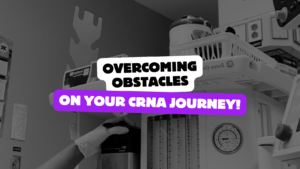What I am noticing is a lot of you guys are fearful and overwhelmed, and just not sure. You are really questioning if you can do this at all, right? And it is understandable, this is a huge undertaking. It’s not something that should be taken lightly, and I understand that. Which is why I created the Facebook group- Future CRNA Society and The CRNA Chase. And also, the Mentorship program and a course that’s coming out later.
What I want to talk about today is I just really want to give you some simple things to think about. Just take the difficulty out of it and I want you to think about this whole CRNA journey with intention and make it simple. And I’m going to tell you why I say do that is because I made it hard to get accepted. I’m just going to be honest with you. It took me from 2004 when I first had the idea in my head that I wanted to be a CRNA to 2011, before I put in my first application. I was rejected twice. I quit for three years. And tried one more time and then that time I put together a plan and then I got accepted.

My Long CRNA Journey
Think about 11 Years at $200,000 a year. That’s like a couple million dollars just in income. But what I also lost that’s more important is freedom and time that I can’t get back. I also can’t get back all the anxiety, overwhelm and stress that I felt. I’m trying to help nurses get into CRNA school because I don’t feel like it has to be that difficult. I want to give you the five ways to simplify this whole thing for you. This is the foundation of my programs. It’s what I figured out when I was trying to get into CRNA school.
What you need to do instead being fearful
There are five main things, and if you can keep those five things at the forefront of everything you do with intention. Then you have a high chance of getting accepted and I promise you I’m going to answer your questions too.
The first thing you want to do is to assess where you’re currently at and that will involve you writing down where you stand currently, and by that, I mean- Do you have your bachelor’s degree already? What certifications do you have? What’s your ICU experience? What leadership experience you have? Volunteering or research you have? Just make note of what you have. Because that is what’s going to guide your next steps right? And by that I mean that’s going to help determine what you need to work on a+or not work on.
Also, what schools you should apply to? Should you retake courses? Should you go for another certification? And you know what? It also can help you determine if being a CRNA is for you at all. Because it will be awful for you to get all the way through this whole journey and then realize this wasn’t for you anyway. Because I’ve seen this happen before with one of my classmates. One of my classmates in CRNA school got all the way through clinicals and then decided it wasn’t for her. Right, so I don’t want that for you. I want you to actually know without a shadow of a doubt like this is for me, right? So #1 is to assess, so make note of your current reality.
The next thing you want to do once you have all this information and are ready to get started is to amplify your strengths that you wrote down on paper. The easiest way to amplify it is through your wording. You can amplify it in your application material or when you contact the school or by attending open houses. Let them know how awesome you are as a nurse, right. So those are three ways you can amplify.
Next, accelerate your efforts. And by that, I mean you could accelerate your efforts by getting your name out there and contacting the school. You accelerate your chances of getting accepted by picking the right school. So, you need to figure out how to pick the right school. You also accelerate your chances by going to go to ICU right away instead of saying oh I’m going to wait until next year. I’m going to wait until the kids are older. I’m going to wait unitl I get my bachelors degree. Unless that ICU says like you have to have a bachelor’s degree you go to ICU right away.
Next comes the application. Or apply right? So, once you have everything because you’ve done the assessment, you’ve amplified, you accelerate it. Now you are ready to get your application material in order right? And so now this includes your CV, your personal statement, letters of recommendation, right? So with your CV. I’m going to give you one of the problems I’m noticing. Most of CVs I see are tailored for the last job that they’re currently in as a ICU nurse. That’s not going to work. Your CV needs to be tailored to the nurse anesthesia program that you’re applying for, so if you’re applying to multiple schools, that CV is probably going to look a little different because it’s going to be tailored. It should be tailored to that school. Here are a few tips.
As far as your personal statement is concerned, you want to make sure that it has a compelling introduction. In the first few sentences needs to make the admissions committee keep reading. And then when they get done, they are like that was awesome, have got to get this person in here for an interview. So, your personal statement should be compelling. The first paragraph should be just captivating. You do that by telling a story, having an anecdote or a short story. That’s all you need to get their attention because when you tell a story, people are engaged and listening.
Your letter of recommendation is usually lacking because it is not our first thought. It is like the deadline is next week and whom can I get to do it? You are thinking about that way wrong. That is all backward. What you need to do is already start forming a relationship with the person you want to do your recommendation letter because they need to know a little bit about you. They need to know about you. Your work habits. Your skills.
On your academics, if they want one from a faculty member and you need to give them time to get this stuff together. You can’t just spring this stuff on them and expect to have a really good letter of recommendation. Now you can spring it on them, but they may not write you the best recommendation letter because they were rushed. Or they might get mad, or they might be like let me just sign this thing and give it back. No, you want to have a stellar letter of recommendation, and it must be from someone who’s seen your work, whether academically or in a critical care setting.
And another thing too, some schools some schools don’t like to see a lot of letters of recommendation from CRNAs and MD’s because they’re saying like, OK, you think I’m just going to admit you based off of you knowing some CRNAs or just because you know some anesthesiologists, right? And so you need to be careful with that. It’s OK if they can vouch for your work. For instance, I got letters of recommendations from some CRNAs and anesthesiologists when I applied. And I applied to a lot of schools, so I mean I was getting them left and right. It was just crazy, right, so? I did that because I worked in PACU for a while, so I had that relationship with the doctors and the CRNAs. So that’s who I asked to write my recommendation letters. So, it worked out for me. But just know that only ask people who’ve seen you actually do some work. Put like that and. Can vouch for your work. All right so that is the application phase.
So, next is the acceptance phase, and to get accepted you must ace the interview. And before that, to get accepted, you must be invited for an interview. If you do the first four steps where you assess, you amplify, accelerate and apply with intention. You got a good chance of getting an interview? So that’s the whole point. It doesn’t matter. All these other steps if you don’t get an interview, it doesn’t matter if you get an interview if you don’t get accepted. It’s really that simple. I was placed on a waiting list first, which is fine. That is a huge accomplishment just to say you were waitlisted. Like being waitlisted, isn’t necessarily a bad thing. For one being waitlisted means they’re not quite sure yet, or they’re looking at other candidates too, but that doesn’t mean they won’t accept you later. What I want you to realize about being on the waiting list is because I was on it for four months. It wasn’t looking good. I was on the waiting list from October to February and classes started in May. So and I had to move 1000 miles away for school so I only had like 3 months once I came off the waiting list to figure it all out. I mean, it was just absolutely crazy, but we made it work. Me, my husband and my kids.
How to get off the waiting list
So, what I want to say about the waiting list though is that. You can be on the waiting list and just sit there and not do anything, right? That’s you don’t want to do that or you could be on that waiting list contacting the school every week, either by phone or e-mail, checking up on your application and asking them basically, what can I do to get off this waiting list? I’m willing to do whatever I can to get off this list, you name it. I’m doing it right so when you do that, it lets them know like you’re serious about being a CRNA. You’re serious about being in their program. When I was on the waiting list I was calling and emailing every week for four months. And eventually the director said, you know Kiki, you’re the only one that calls up here and checks on their application out of all the people on the waiting list. To make a Long story short. I called her and finally talked her on the phone. Because sometimes when you call you just going to get the secretary. This particular day, she answered the phone and I was like Oh my God like I’m talking to the director, you know. So she said you must really want this because you call up here every week and you’re the only one that checks on their application. And I was like yes, I really do like I’m dead serious. She said, do you feel like you could do the work? Yes, ma’am, I feel like I can do the work. I know I can. So that’s how I was talking. The very next day I got a call from the school said I had been accepted. That’s another way to amplify right amplify your strengths, amplify your confidence, amplifying that this is your purpose.
I want people who are on a waitlist to pat themselves on the back because that is a huge accomplishment. All you got to do now is get you off the waiting list. So that’s a huge accomplishment. The other thing. OK, so we’re still talking about the accepted phase. So in order to get accepted you have to ace your interview, right? And so. When it comes to your interview, you want to be overly prepared to be honest with you. Now you don’t want to be so prepared to where you sound like robot. So I recommend, definitely do some practice interviews. You can do mock interviews, I offer mock interviews. You can definitely go through me to do them, or you can just do it with your family or your friends. Whoever you can, that is going to give you very honest feedback. Someone who knows what’s going on and understands the whole CRNA school process? That’s who you want, helping you, you know, as far as you practice, and so it’s really all about being able to answer those questions. Which really when you think about it, it’s not hard questions, unless it’s a lot of clinical questions. But usually it’s a lot of personal and behavioral questions which shouldn’t be that hard. Questions like- You know why you want to be the CRNA? Why anesthesia? Tell me a time, tell me a time you had a difficult patient.These questions are not really hard, but they’re hard in the moment because you can’t really think because you’re so stressed and you’ve got a lot on you. You don’t know where to start with the answer, and so that’s what I teach a lot in my program and in the mock interviews. So again if you can get that down then you will get accepted and on your way to becoming a CRNA and living the life you deserve with the freedom you deserve and no longer having to work at the bedside.
The bottom line
It won’t be anything like at the bedside, so then you’ll be in control of your own schedule. Your money will look a lot better, right? And I know we shouldn’t necessarily do things only for money. But money is important to everything that we do, so it’s just part of it so. If you’re going to do this job, you would want to be compensated for it, because it is highly demanding mentally and emotionally. So again, you want to assess, amplify, accelerate, apply, then get accepted. That is the five-step formula, which is the CRNA school Accelerator. It took me three tries, but the third time I got in, UM, it was all about perseverance. What I’m noticing right now is just so many nurses right now, and aspiring CRNAs just really fearful and just need help. Just staying the course and becoming a CRNA as I like to say so. For me, I believe that you either have to get accepted or you have to get accepted. We’re not taking no for an answer. So if you need help getting into a CRNA program without overwhelm or fear then apply to join the CRNA School INTENSIVE so you can become what you always wanted- a CRNA.







